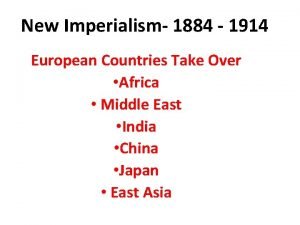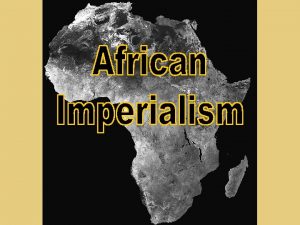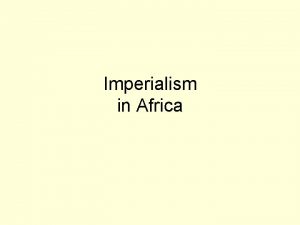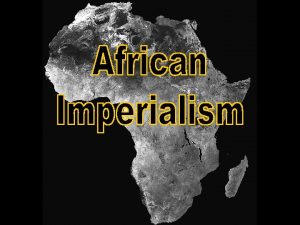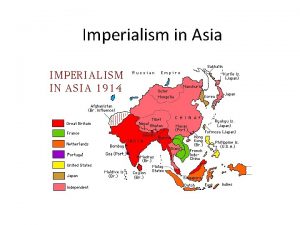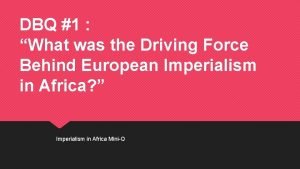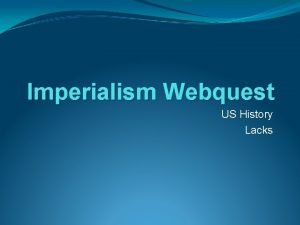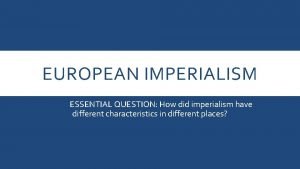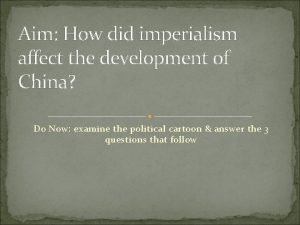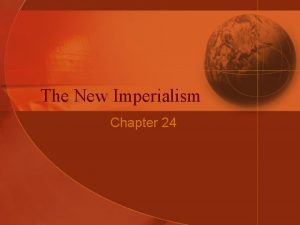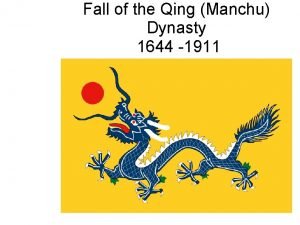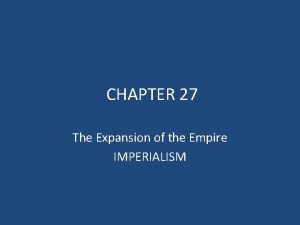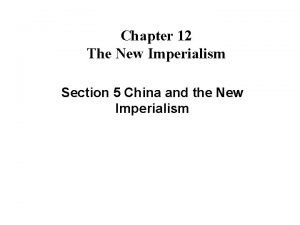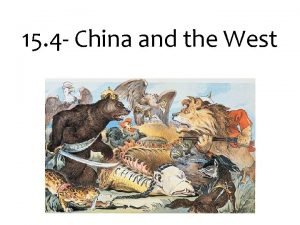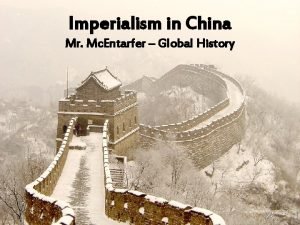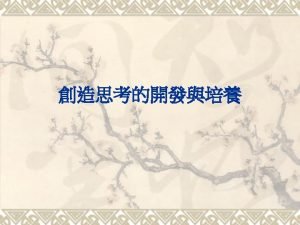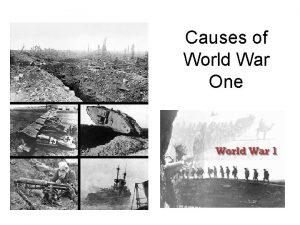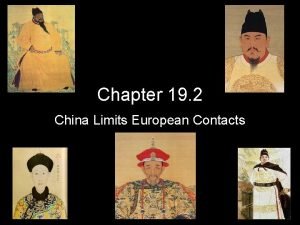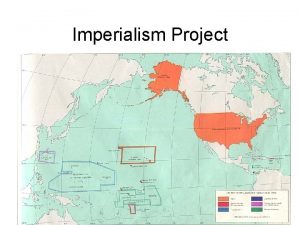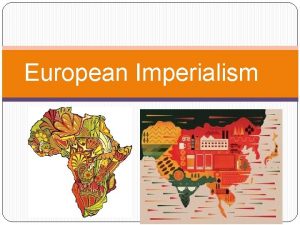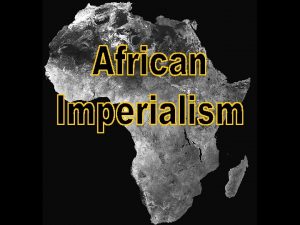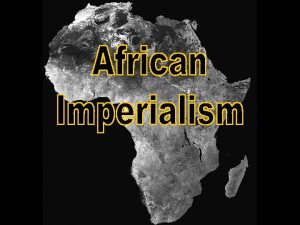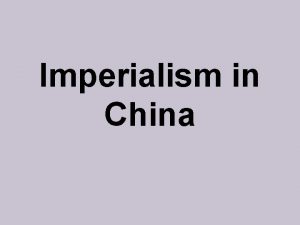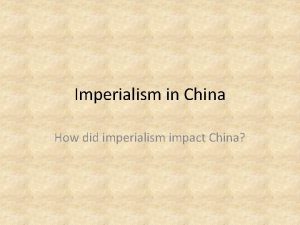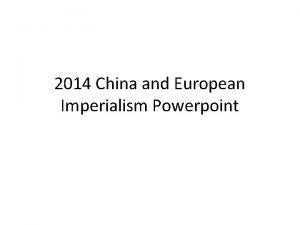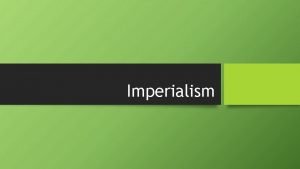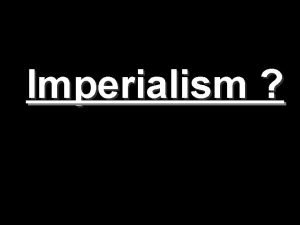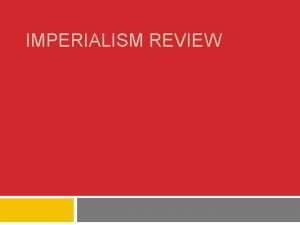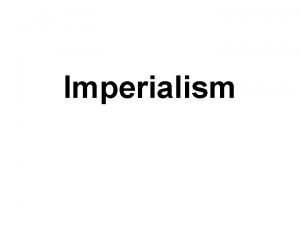European Imperialism in China Why Was China Imperialized




















- Slides: 20

European Imperialism in China

Why Was China Imperialized? • China had many mineral resources • Large Chinese population was a potential market to sell European products to • Great demand for China’s porcelain, silk, & tea • China had no sufficient military power • China’s strong sense of pride & ethnocentrism increased its isolation from outside “barbarians” & prevented it from learning from other civilizations

The Chinese • Chinese society was based on very traditional values (Confucius – order to society) • The Chinese were ethnocentric - believed their ethnicity was the best

5 Confucius Relationships • ruler subject • husband wife • father son • elder brother younger brother • friend = friend

The Economy • China had a self-sufficient agricultural & mining economy • Successfully fed 300 million people (good nutrition population boom) • Had raw materials that Europeans wanted: sugar, ginger, silk, porcelain, tea

Trade with Others • What did Europe have that China wanted? NOTHING • China remained isolated because they didn’t need European goods • Their attitude was if China did not invent it, then China did not need it! • Balance of trade was in China’s favor – they earned more for exports than they spent on imports from others

The British in China • The British imported millions of pounds of tea from the Chinese • Since they were losing money, they wanted to find something that they could sell to China in great quantities OPIUM was (a crop from their other the answer India colony)

Opium Trade • Britain flooded China with opium • 12 million addicted to smoking opium by 1835

Chinese Response • Emperor was angry because the opium addiction caused social, moral & economic problems for the country • Letter from emperor’s advisor to Queen Victoria: “By what right do they [British merchants]… use the poisonous drug [opium] to injure the Chinese people? . . . I have heard that the smoking of opium is very strictly forbidden by your country; that is because the harm caused by opium is clearly understood. Since it is not permitted to do harm to your own country, then even less should you let it be passed on to the harm of other countries. ”

The Opium War 1839 -1842 • Chinese gov’t banned all trade in opium • Chinese gov’t destroyed a stockpile of British opium at a warehouse in 1839 • British responded by sending warships to China

The Opium War 1839 -1842 • Mostly fought at sea • China’s outdated ships couldn’t compete against the British organization and steampowered gunboats & cannons • British defeated the Chinese

Treaty of Nanjing 1842 Treaty to end the Opium War • China forced to open 5 ports for trade and allow British merchants & gov’t officials to live in those port cities • Gave Britain the island of Hong Kong • returned to China in 1997 • China had to pay for the destroyed opium • Extraterritorial Rights - exemption from Chinese law in certain port cities

Spheres of Influence • The Treaty of Nanjing was the 1 st of what would be called the unequal treaties • Other nations (France, Russia, Germany, & Japan) forced China to sign treaties granting them the same trading rights as Britain • The treaties created spheres of influence area in which a foreign nation controlled trade & investment

Spheres of Influence

Open Door Policy 1899 • US was afraid that Europe would divide up China & that the American traders would be left out • US declares the Open Door Policy – all foreign nations were to enjoy equal trading rights in China • Policy protected American trading rights in China • Policy protected China from official colonization

Keep in mind… European countries & the US never “take over” China, they just economically and politically dominate China

Boxer Rebellion 1890 • Society of the Harmonious Fists (called Boxers) Causes of the Boxer Rebellion: • China’s inability to defend itself against imperialism caused unrest • Empress was thought of as corrupt & not helping to improve people’s lives • Chinese resented special privileges granted to foreigners (extraterritorial rights) • Many traditional Chinese people resented the Chinese Christians who were protected by foreign missionaries


Boxer Rebellion 1890 • The Boxers’ Goal: to drive out foreigners from China • Shouting “Death to the foreign devils, ” they surrounded the European section of Beijing & held it under siege for several months • A multinational force of 20, 000 troops (British, French, German, Austria, Italy, Russia, Japan, & US) put down the rebellion • Again, European superior weapons are to blame for the loss

Connection… Question: How are the Boxer Rebellion & the Sepoy Mutiny similar? Answer: Both opposed European imperialism & wanted to end foreign domination of their country
 European imperialism in china
European imperialism in china Who imperialized mozambique
Who imperialized mozambique White man's burden
White man's burden Who imperialized africa
Who imperialized africa Hey hey bye bye
Hey hey bye bye Africa 1890
Africa 1890 Old imperialism examples
Old imperialism examples Imperialism asia
Imperialism asia The driving force behind european imperialism in africa
The driving force behind european imperialism in africa Boxer rebellion webquest
Boxer rebellion webquest Legacy of imperialism
Legacy of imperialism China imperialism cartoon
China imperialism cartoon Chapter 24 section 5 china and the new imperialism
Chapter 24 section 5 china and the new imperialism China and imperialism
China and imperialism China and imperialism
China and imperialism Chapter 12 section 5 china and the new imperialism
Chapter 12 section 5 china and the new imperialism Western imperialism in china
Western imperialism in china Global history imperialism in china
Global history imperialism in china Dont ask why why why
Dont ask why why why Causes of ww1
Causes of ww1 China limits european contacts
China limits european contacts
